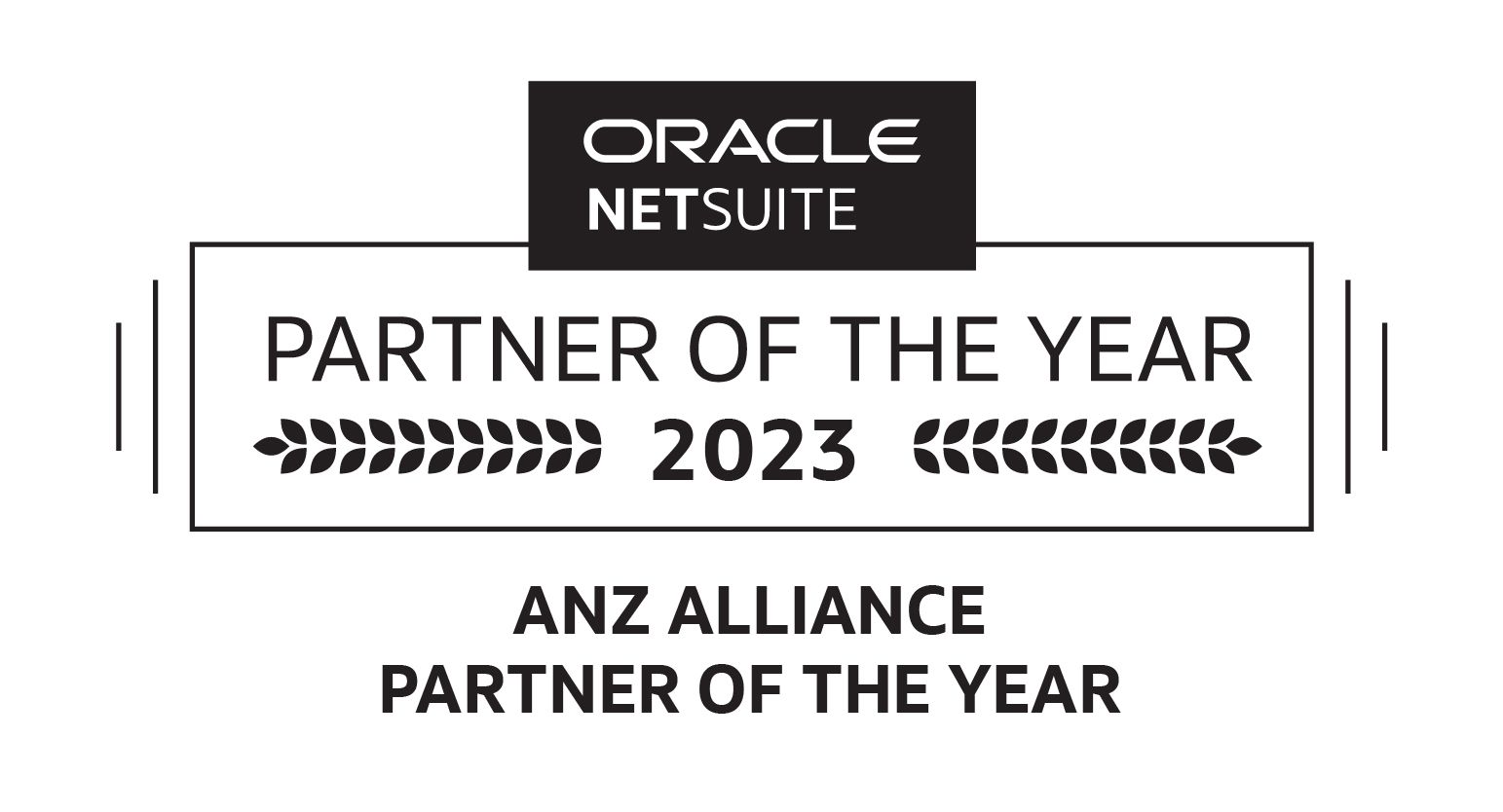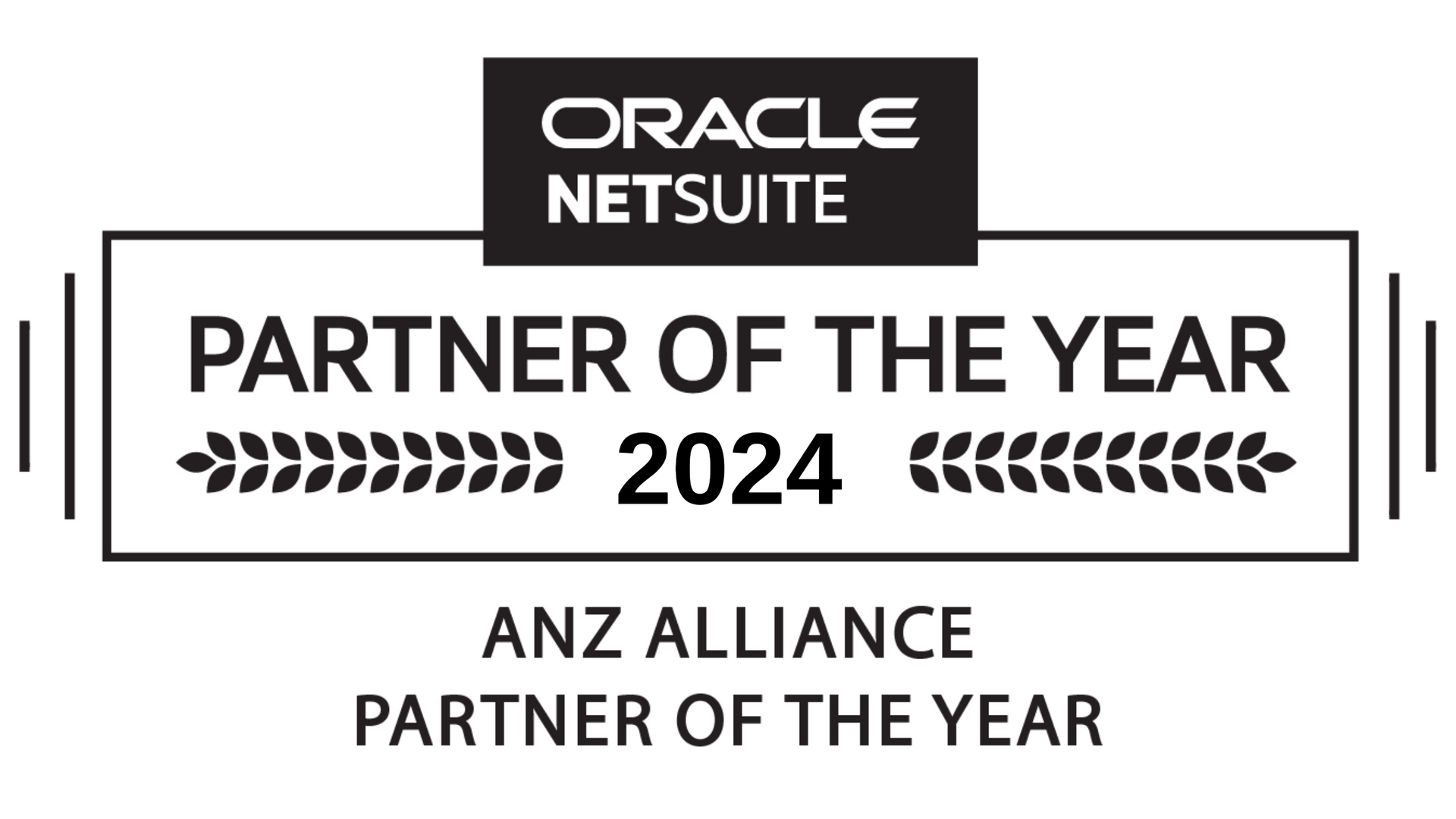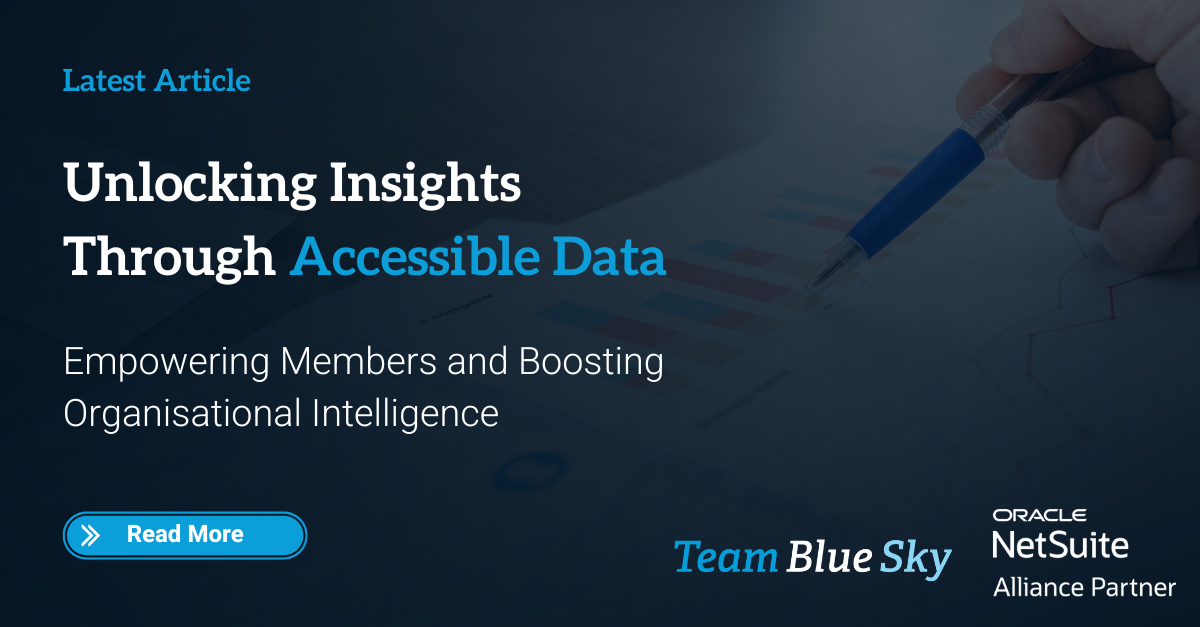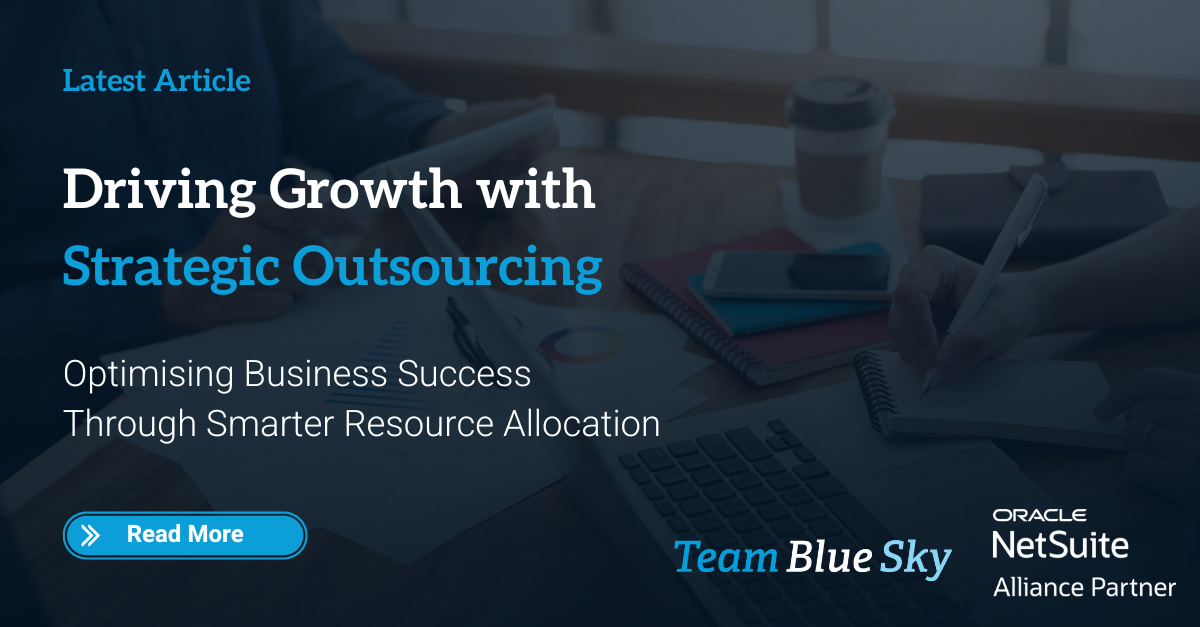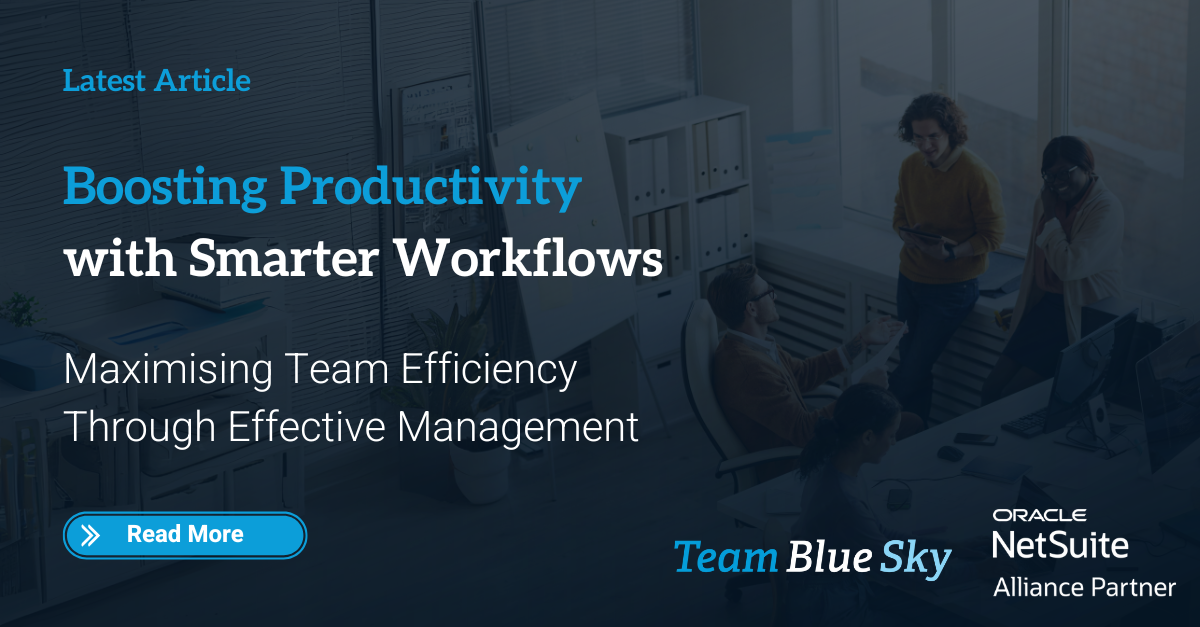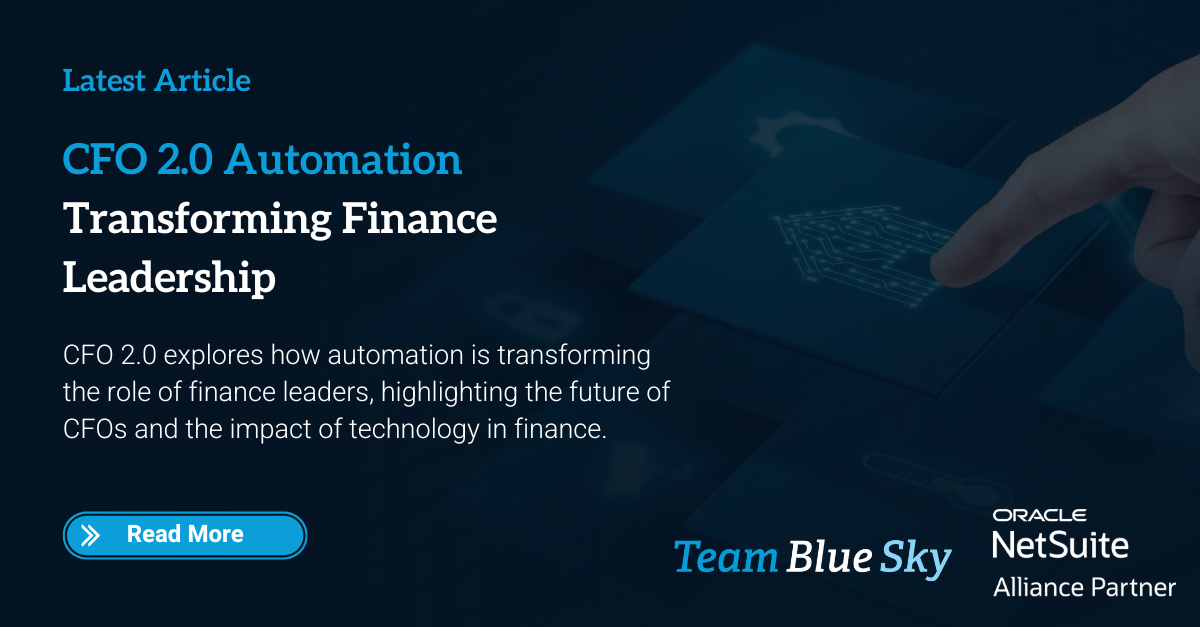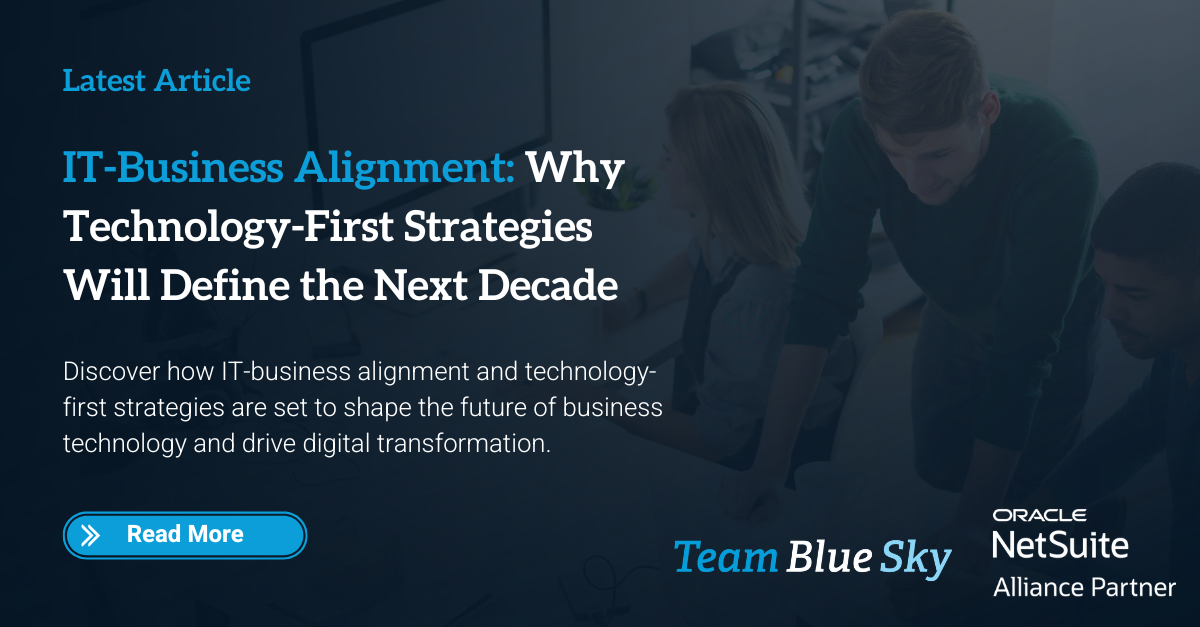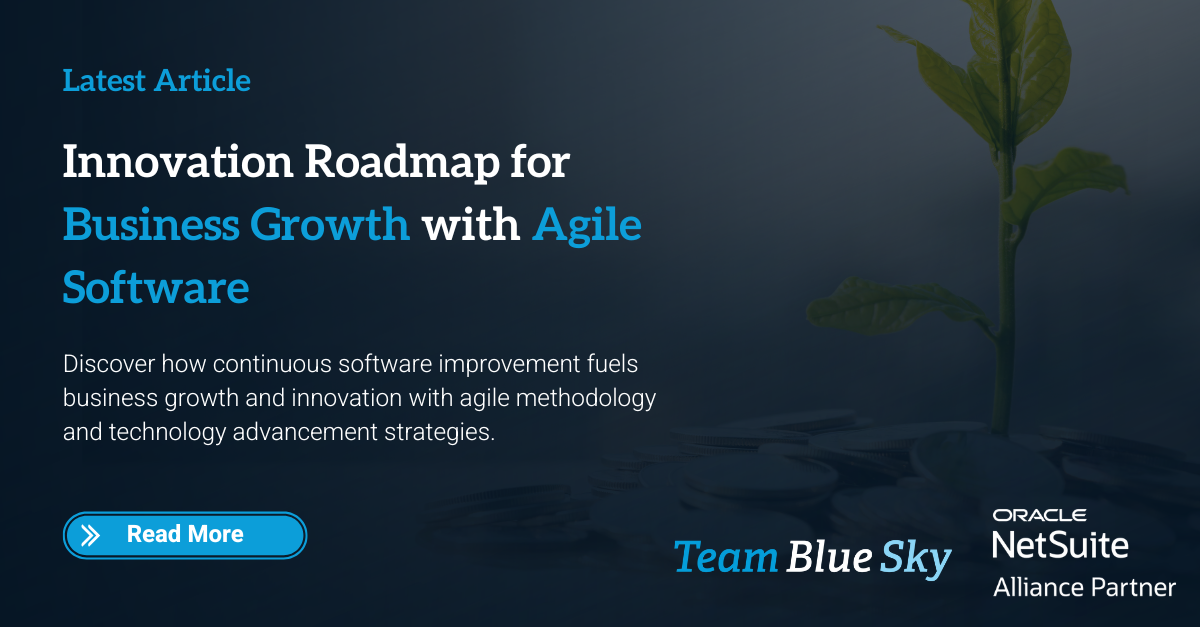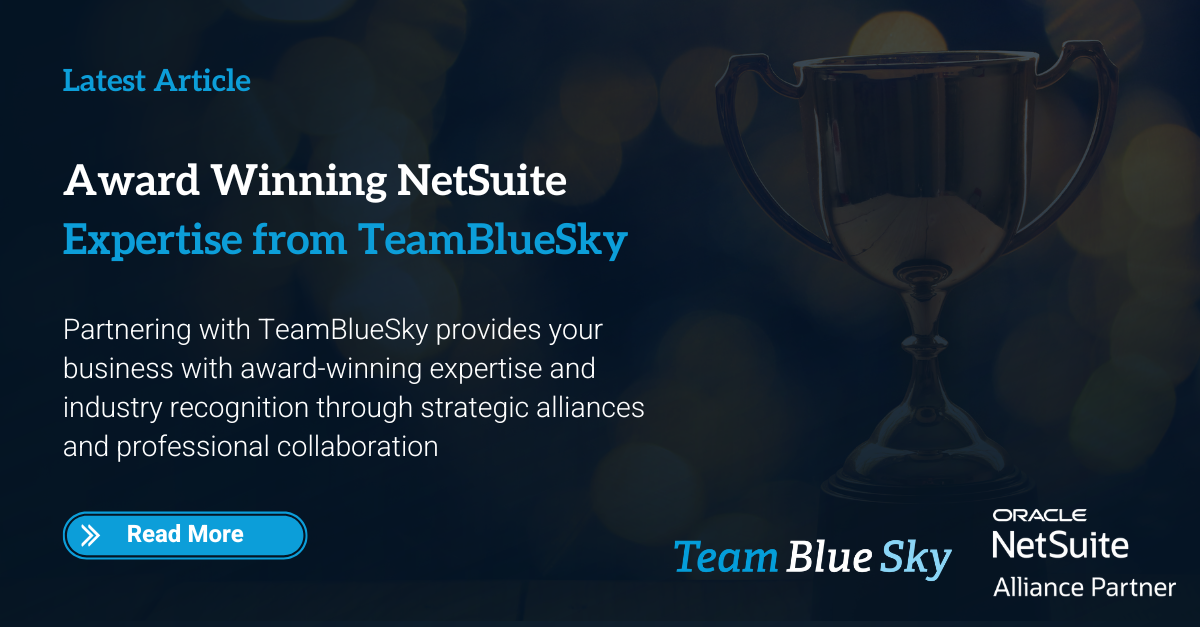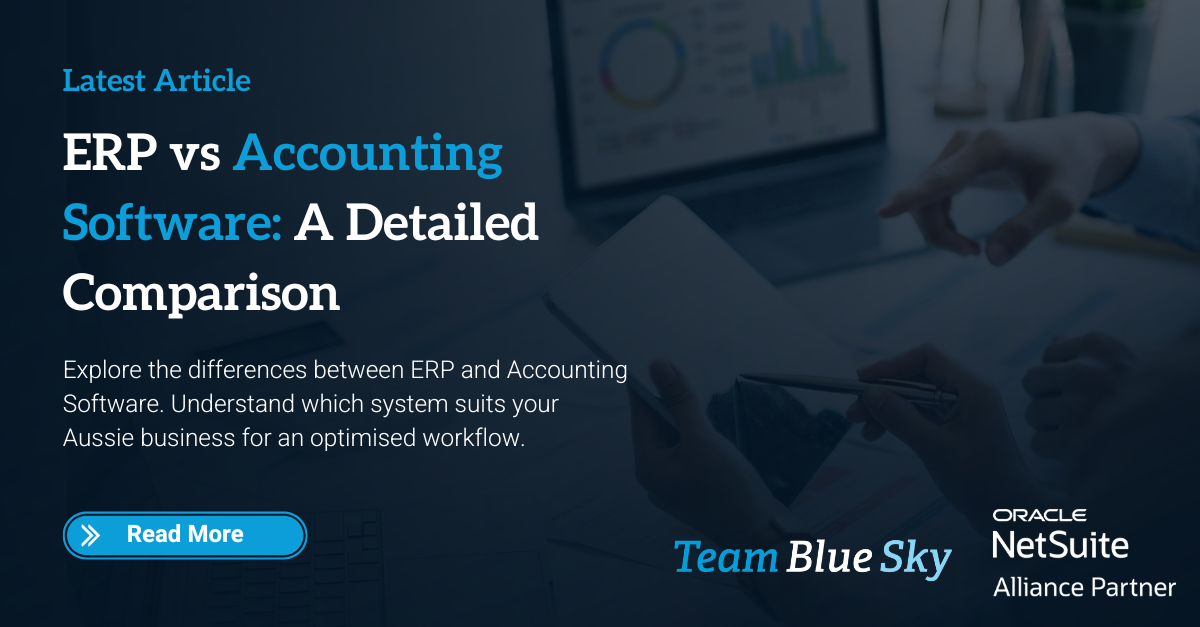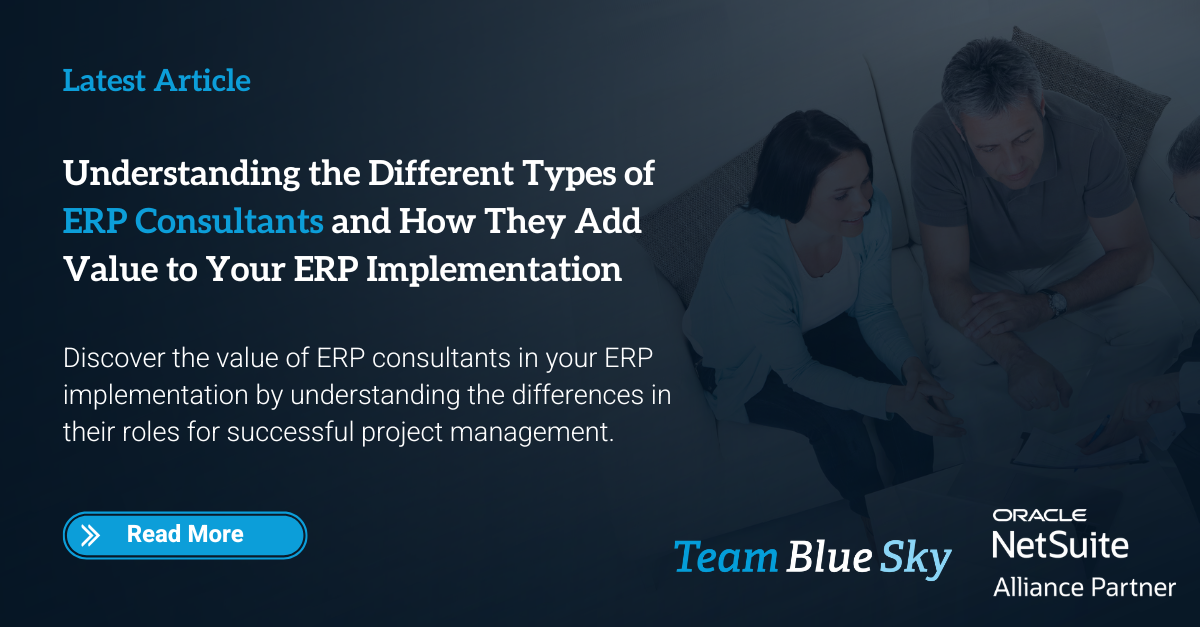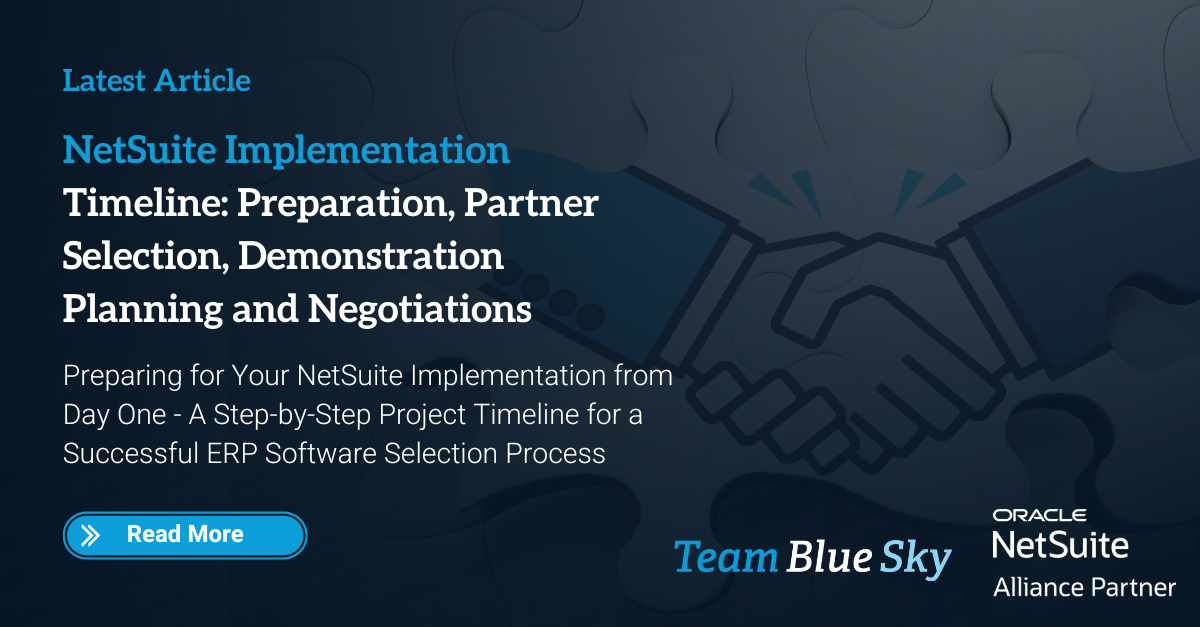Partnering and Planning: Two Critical Decisions for Your ERP Project
When you pick the right NetSuite partner for your ERP (Enterprise Resource Planning) project, it makes a big difference in how well your business runs. A good partner makes sure everything is set up right and works just for what your business needs, making your team work better and faster.
Henry Sack, the Managing Director of TeamBlueSky and an expert in setting up NetSuite shares his thoughts. He says, "Choosing someone who really gets your business and knows how to make NetSuite work for you is key. It's all about making your operations smoother and helping you grow."
Key Takeaways
- Picking the right NetSuite partner is very important. Look for someone with a good history, knows your industry, and understands what you need.
- Know what you want from NetSuite before you start. Look closely at your business to see where it can help you do better and grow.
- Plan carefully. Set realistic deadlines, make sure you have enough people and resources and know what steps you need to take.
- A good plan and approach mean you can set up the system without big problems, making sure it does what your business needs.
- Be ready for challenges. You'll need to be flexible, talk well, and solve problems. Having a backup plan helps a lot.
- Use smart practices like getting everyone involved early, training your team well, and keeping everyone updated to make sure your ERP project goes well.
ERP Partner Evaluation: Steps and Key Considerations
Understanding Your Needs
Identify Your Business’ ERP Requirements
Before starting your search for an ERP partner, it's vital to have a clear understanding of your business needs and long-term goals. This clarity will guide you in selecting a partner whose services align with your objectives. Henry Sack emphasises the importance of selecting partners who not only bring relevant experience to the table but also possess the necessary credentials to support your business as it evolves. This means looking for partners that can scale their services to match your business growth and tailor the ERP system to meet changing needs.
Evaluating Potential ERP Partners
Look for Relevant Experience and Credentials
The experience and credentials of a potential ERP partner are critical factors to consider. A partner with a proven track record in your industry is likely to understand the specific challenges and opportunities your business faces. They should also have a strong portfolio of successful implementations, demonstrating their ability to deliver results. Henry suggests reviewing real-life examples of the partner's work to gauge their expertise and success in delivering projects similar to what you envision for your business.
Assess Their Support and Training Offerings
Ongoing support and training are essential for ensuring the long-term success of your ERP implementation. A good partner will offer comprehensive training programs to empower your team to make the most of the NetSuite system. They should also provide reliable support to address any issues that arise post-implementation. For businesses operating on a global scale, choosing a partner with an international presence can be advantageous. Such partners are better equipped to understand and navigate the complexities of different regulatory environments, ensuring consistent service across all your operations.
Look for Relevant Experience and Credentials
The experience and credentials of a potential ERP partner are critical factors to consider. A partner with a proven track record in your industry is likely to understand the specific challenges and opportunities your business faces. They should also have a strong portfolio of successful implementations, demonstrating their ability to deliver results. Reviewing real-life examples of the partner's work is advised to gauge their expertise and success in delivering projects similar to what you envision for your business.
Assess Their Support and Training Offerings
Ongoing support and training are essential for ensuring the long-term success of your ERP implementation. A good partner will offer comprehensive training programs to empower your team to make the most of the NetSuite system. They should also provide reliable support to address any issues that arise post-implementation. For businesses operating on a global scale, choosing a partner with an international presence can be advantageous. Such partners are better equipped to understand and navigate the complexities of different regulatory environments, ensuring consistent service across all your operations.
Cultivating a Successful ERP Partnership
Establish a Clear Communication Plan
Clear and open communication is the foundation of a successful partnership. Henry advises setting mutual goals and expectations at the outset of the project to avoid surprises down the line. This includes agreeing on project milestones, deliverables, and timelines. Regular updates and meetings are essential for keeping both parties informed of progress and any challenges that may arise.
Leverage Collective Expertise
A collaborative approach to the ERP implementation project can significantly enhance its success. By working closely together and leveraging each other's strengths, your business can benefit from the partner's expertise while ensuring that the project aligns with your specific needs and goals. Henry highlights the importance of mutual respect and collaboration, stating that using each other's strengths effectively can make a substantial difference in the outcome of the project.
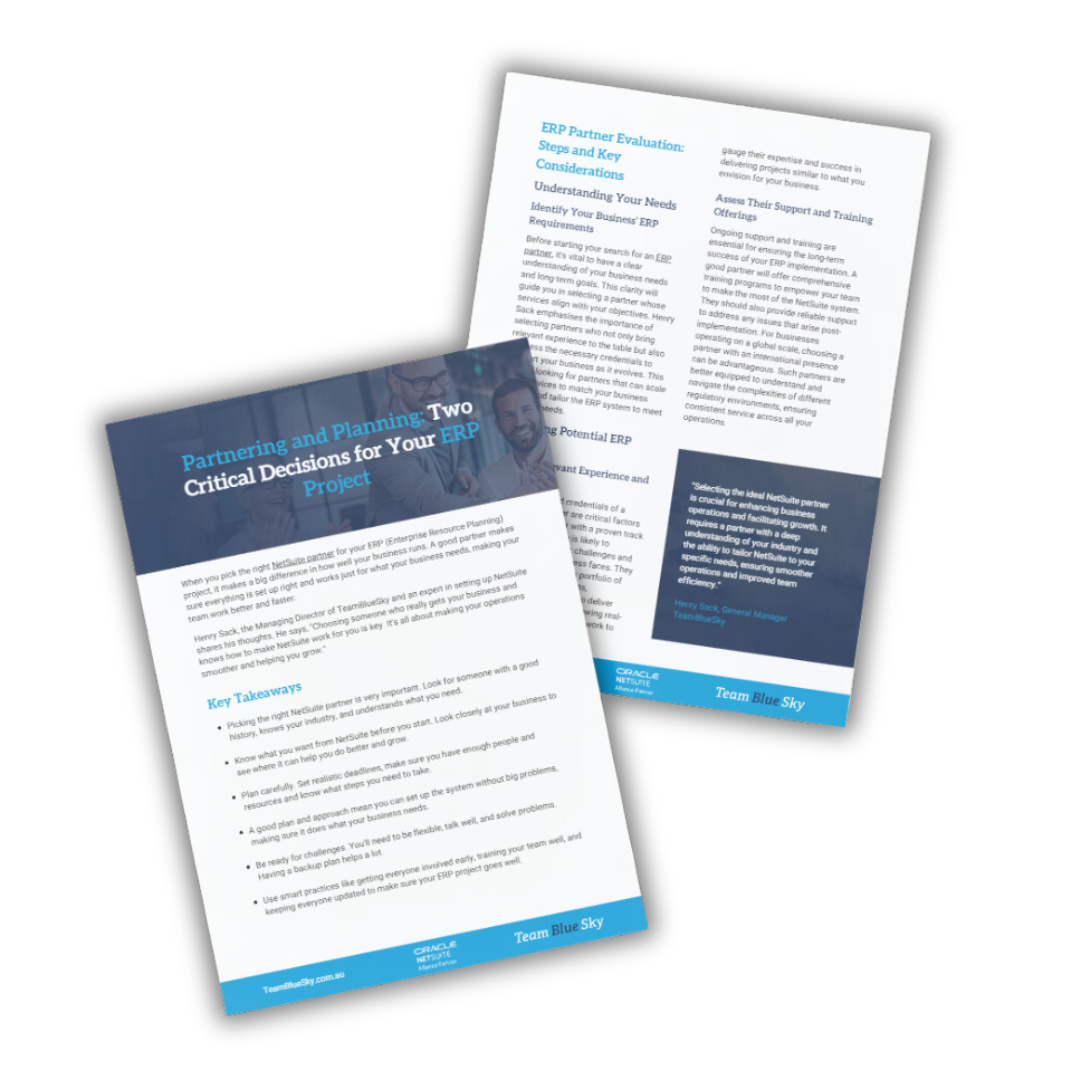
Short on time? Download this article to read later or share with a colleague.
Partnering and Planning: Two Critical Decisions for Your ERP Project

Short on time? Download this article to read later or share with a colleague.
Partnering and Planning: Two Critical Decisions for Your ERP Project
ERP Planning: Setting the Foundations for ERP Success
Planning and implementing an ERP system, like NetSuite, requires a well-thought-out strategy to ensure success. Henry Sack, with his extensive experience in NetSuite implementations, shares valuable insights into making this process smooth and effective.
Planning for an ERP Implementation
Creating a Comprehensive Plan
Developing a detailed plan is crucial for the successful implementation of an ERP system. This plan should outline each step of the implementation process, from the initial planning phase to the final go-live, with specific resources allocated to each task. Setting clear milestones along the way helps track progress and ensures that the project stays on schedule. Henry stresses the importance of having backup plans in place. These contingencies are vital for addressing any unexpected challenges that may arise, minimising disruptions to the project timeline.
Setting a Realistic Timeline
A realistic timeline is key to the smooth execution of an ERP project. It's important to set deadlines that reflect your business's unique operational needs and allow for flexibility. Henry advises being prepared to adjust the timeline as necessary based on project developments and to regularly review project progress. This approach helps identify potential delays early on, allowing for timely adjustments to keep the project on track.
Choosing an Implementation Methodology
The choice between Agile and Waterfall methodologies for ERP implementation depends on your project's specific needs and your organisation's culture. Agile methodology is beneficial for projects requiring flexibility and the ability to adapt to changes quickly. It involves iterative cycles of development and testing, allowing for continuous improvement based on feedback. Waterfall methodology, on the other hand, is more structured, with each phase of the project completed before moving on to the next. Henry highlights the importance of incorporating feedback from all stakeholders throughout the project and maintaining detailed documentation. This approach not only ensures that the project continuously improves but also aids in training new team members and troubleshooting post-implementation issues.
Choosing an Implementation Methodology
The choice between Agile and Waterfall methodologies for ERP implementation depends on your project's specific needs and your organisation's culture. Agile methodology is beneficial for projects requiring flexibility and the ability to adapt to changes quickly. It involves iterative cycles of development and testing, allowing for continuous improvement based on feedback. Waterfall methodology, on the other hand, is more structured, with each phase of the project completed before moving on to the next. Henry highlights the importance of incorporating feedback from all stakeholders throughout the project and maintaining detailed documentation. This approach not only ensures that the project continuously improves but also aids in training new team members and troubleshooting post-implementation issues.
Addressing Common Implementation Challenges
Data Migration Challenges
One of the most significant challenges in ERP implementation is migrating data from old systems to the new ERP system. This process involves transferring large volumes of data, which can be complex and time-consuming. Issues such as data loss, corruption, or incompatibility can arise. Henry emphasises the importance of planning and executing a meticulous data migration strategy. He advises conducting trial runs, validating data post-migration, and ensuring data integrity. Open communication about these potential challenges and thorough training can prepare the team for a smooth transition.
Resistance to Change
Another common issue is resistance to change among team members. People are naturally inclined to stick with familiar processes, and introducing a new system can lead to uncertainty and anxiety. Henry suggests addressing these concerns by fostering an open dialogue about the benefits of the new ERP system and how it will improve day-to-day operations. Providing comprehensive training and support is crucial in helping team members feel more comfortable and confident in using the new system.
Avoiding ERP Implementation Failures
Thorough Testing
Inadequate testing is a common reason for ERP implementation failures. Testing should be extensive and cover all aspects of the ERP system to ensure it meets the specific needs of your business. Henry recommends involving end-users in the testing phase, as they can provide valuable insights into how the system performs under real-world conditions. This approach helps identify and fix issues before the system goes live, reducing the risk of operational disruptions.
Comprehensive Training
Failure to provide sufficient training can also lead to implementation failures. It's essential that all users, from front-line staff to management, understand how to use the new system effectively. Henry suggests implementing a training program that covers not only the basic functionalities of the ERP system but also the advanced features that users will need. Continuous training and support after the system goes live are equally important to address any questions or issues that may arise.
Keeping Everyone Informed
Keeping all stakeholders informed throughout the ERP implementation process is key to avoiding surprises and ensuring everyone is on the same page. Regular updates on the project's progress, challenges faced, and milestones achieved can help maintain transparency and build trust. Henry underscores the importance of open lines of communication between the implementation team, management, and end-users to foster a collaborative environment.
Final Thoughts
Selecting the right NetSuite partner and implementing an Enterprise Resource Planning (ERP) system are pivotal actions for businesses focused on optimising their operations and boosting efficiency. This comprehensive overview has provided essential guidance on choosing an appropriate partner, understanding key requirements, planning effectively, executing meticulously, overcoming prevalent challenges, adhering to established best practices, and anticipating the future trajectory of ERP technologies. The insights offered emphasise the critical nature of detailed preparation, strategic execution, and continuous adaptation to technological progress to fully leverage ERP solutions. Businesses are strongly encouraged to engage with seasoned NetSuite implementation partners capable of
Frequently Asked Questions (FAQs)
How do I choose the right NetSuite partner for my business?
Selecting a partner requires a focus on their track record, industry-specific expertise, and the breadth of support offered throughout the implementation lifecycle. A partner's history of success demonstrates an understanding of your sector, and the ability to provide extensive post-implementation support are key indicators of their capability to meet your needs.
What are the key requirements to understand before implementing NetSuite?
A thorough comprehension of your business’s specific needs, including aspects like financial management, inventory control, and customer relationship management, is essential. These requirements will direct the customization and utilisation of NetSuite, ensuring the solution aligns with and supports your business objectives.
Can you outline the essential phases of effective NetSuite implementation?
Effective NetSuite implementation unfolds in several core phases: project initiation, which involves setting clear objectives and expectations; system design, tailored to specific business requirements; configuration and development, where the system is customised and prepared for use; testing, to validate functionality and user acceptance; and finally, deployment, followed by ongoing support to address any emerging needs or challenges.
What are common challenges faced during ERP implementation and how can they be overcome?
Common hurdles in NetSuite ERP implementations include resistance to change, data migration complexities, budgetary constraints, and adhering to the NetSuite Implementation Timeline. These can be effectively managed by engaging stakeholders early in the process, conducting comprehensive data preparation, and maintaining transparent communication regarding budget and project progress to ensure alignment and mitigate risks.
What best practices should be followed for successful ERP implementation?
Successful ERP implementation is underpinned by setting achievable objectives, securing executive sponsorship, providing extensive training, focusing on data integrity, conducting regular performance reviews, being adaptable to change, and selecting an experienced implementation partner. These practices collectively contribute to a resilient and effective ERP system.
What benefits does implementing an ERP system like NetSuite offer businesses?
Implementing an ERP system like NetSuite provides numerous benefits, including streamlined operations, enhanced financial oversight, improved inventory management, superior customer relationship management, and actionable insights into business performance. These advantages contribute to increased operational efficiency, cost reductions, and improved market competitiveness.

Henry Sack
General Manager

With over 12 years of experience as a NetSuite implementation consultant, Henry Sack leads TeamBlueSky’s team of NetSuite and accounting experts in his role of General Manager.
TeamBlueSky is a leading Australian
NetSuite Alliance Partner whose mission is to provide critical
NetSuite BPO and
Payroll services to NetSuite clients who are wanting to simplify their
back office processes and partner with a leading
NetSuite administration expert.
TeamBlueSky have also partnered with global Suite Developer Network partners to offer local solutioning, implementation and support services for global NetSuite SuiteApps.
More From Our Blog
Interested in learning more?
Let TeamBlueSky take care of your accounting and back office administration while you focus on growing your business.
Send Us An Enquiry
We will get back to you as soon as possible.
Please try again later.
Contact Us
Phone: 1300 174 382
Email: hello@teambluesky.com.au
Address: PO Box 880, Glenelg, SA, 5045, Australia
Useful Links
Keep Up To Date With Our Latest News and Best Advice
You need a helping hand with your project?
We will get back to you as soon as possible
Please try again later
All Rights Reserved | TeamBlueSky
Website Created and Managed by SaaSMouth - NetSuite Marketing Specialists


